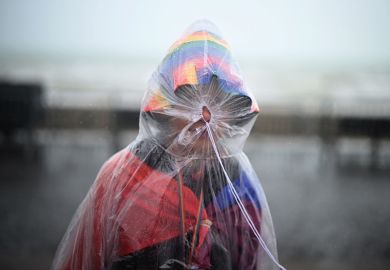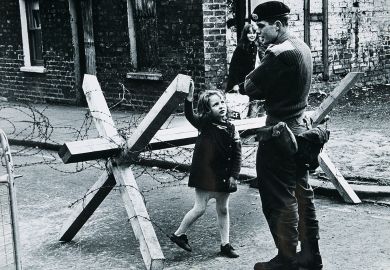The popular image of druids is that of a white-clad priesthood who practised human sacrifice, collected mistletoe with golden sickles and had something to do with Stonehenge. The fascination that they continue to exert appears almost to be in inverse proportion to what is known about them. Modern druidism traces its roots back no further than the 18th century. Its principal founder was the Welshman Iolo Morganwg, who cobbled together a hotchpotch of local tradition and mediaeval bardic poetry, together with a leavening of forged documents, which were published in 1848 as The Iolo Manuscripts.
However, as Peter Beresford Ellis points out in his readable and well-researched survey, two centuries arguably amounts to something of a pedigree in itself. This is more than can be said for the witch-cult ("Wicca") beloved by the tabloid press, whose rituals and dogma were concocted in their entirety within the past few decades.
It is surprising that the modern druids appear to have made no attempt to revive any authentic druidic beliefs or rituals, and remain content with a sort of woolly "green'' pantheism. The reason is presumably that the druids have remained strangely elusive throughout recorded history, and the facts are consequently not readily accessible. Ellis's book could provide a useful guide to those who wish to learn more.
There really exist only two principal sources of understanding. The first consists of a scattered collection of references by classical authors. The second is mediaeval Celtic (principally Irish) literature, in which druids frequently play an important role. Neither affords a wholly reliable basis for reconstruction of the authentic druidism that undoubtedly fulfilled an important function in pre-Christian Celtic society.
Greek and Roman writers described the druids according to varying schools of thought either as refined Pythagorean philosophers or as fearsome Celtic medicine men. Many of these accounts are derivative, and it was suggested by J. J. Tierney in an influential paper that virtually all classical writers drew for their understanding of Celtic society on the writings of the Greek polymath Posidonius, which survive only in extracts quoted by other authors. Tierney extended this dependence even to Posidonius's contemporary, Julius Caesar. However, Caesar's authority has been rehabilitated by Daphne Nash, who reminds us that he was after all a highly intelligent observer who spent several years campaigning in Gaul, Spain, and Britain, where he possessed ample opportunity for first-hand observation of native custom and belief.
The advantage possessed by the classical sources is that they were for the most part written at a time when druidism still flourished. Pliny claimed that the order was suppressed by Tiberius, who (of all people) objected to the barbarous practice of human sacrifice. However, in reality it survived for two or more centuries in Gaul and Spain, and very likely also in Britain. The weakness of the classical accounts lies in their brevity, the likelihood of mutual dependence and repetition, and their tendency to interpret alien cultures in light of beliefs prevalent in their own society.
Caesar was probably correct in saying that druidic doctrines were preserved and transmitted in oral form, so that it is unsurprising that very little has survived in the way of artefacts. Scattered survivals, such as the Gaulish Calendar of Coligny and the Celtiberian inscription at Botorrita in Spain, afford fascinating exceptions to this rule.
References to druids and druidry in mediaeval Irish literature are numerous and evocative. But since this literature was composed and written exclusively by Christians centuries after the conversion of Ireland, it is never wholly clear how far it may be depended upon as a safe guide to authentic pagan mythology and practice. An extreme sceptical viewpoint has recently been advanced by Kim McCone, who argues that virtually all themes in early Irish literature derive from the Bible or classical literature. But this negative view appears very dubious, since the names and motifs can in very many cases be persuasively shown to be of native pagan derivation.
Ellis's book provides a lucid but not wholly reliable guide to the literature. Unfortunately Celtic names and words are frequently misspelt, and untenable hypotheses are advanced. The Irish annals do not provide a reliable chronology for the early centuries ad, there is no evidence that Christians destroyed a corpus of druidic literature, Merlin does not feature in the Historia Brittonum, and it is not credible that the Pelegian heresy derived from druidic doctrine. The author need not have lamented the absence of an authentic pre-Christian cosmology had he read (for example) the brilliantly revealing analysis of Tochmarc Etaine by Francoise le Roux. He also omits any discussion of strong shamanistic traits existing in Celtic pagan tradition, exemplified strikingly by the primitive Merlin figure of early Welsh poetry.
On the other hand, there is a thought-provoking section on early Irish and Welsh astrology, which persuasively suggests on linguistic grounds an early tradition of star-lore, which is confirmed by the words of Caesar and the long tradition of celestial observation that alone can account for the creation of the Coligny Calendar.
The book concludes with a useful if not wholly satisfactory bibliography. The general reader would be advised to steer clear of some of the more outdated and eccentric works included, which I tactfully refrain from identifying. Striking omissions, on the other hand, include Damian McManus on ogham writing, the definitive edition of the Coligny Calendar by Duval and Pinault, and the recent stimulating analysis of its modus operandi by Garrett Olmsted. The 1961 edition of Les Druides by Francoise le Roux is listed, but not the greatly expanded edition she wrote subsequently in collaboration with Christian-J. Guyonvarc'h, which was published in 1986. English readers interested in this perennially fascinating subject will not be well served until that magisterial work appears in English translation.
Nikolai Tolstoy is a historian and biographer.
The Druids
Author - Peter Beresford Ellis
ISBN - 0 09 472450 4
Publisher - Constable
Price - £16.95
Pages - 304pp
Register to continue
Why register?
- Registration is free and only takes a moment
- Once registered, you can read 3 articles a month
- Sign up for our newsletter
Subscribe
Or subscribe for unlimited access to:
- Unlimited access to news, views, insights & reviews
- Digital editions
- Digital access to THE’s university and college rankings analysis
Already registered or a current subscriber? Login



